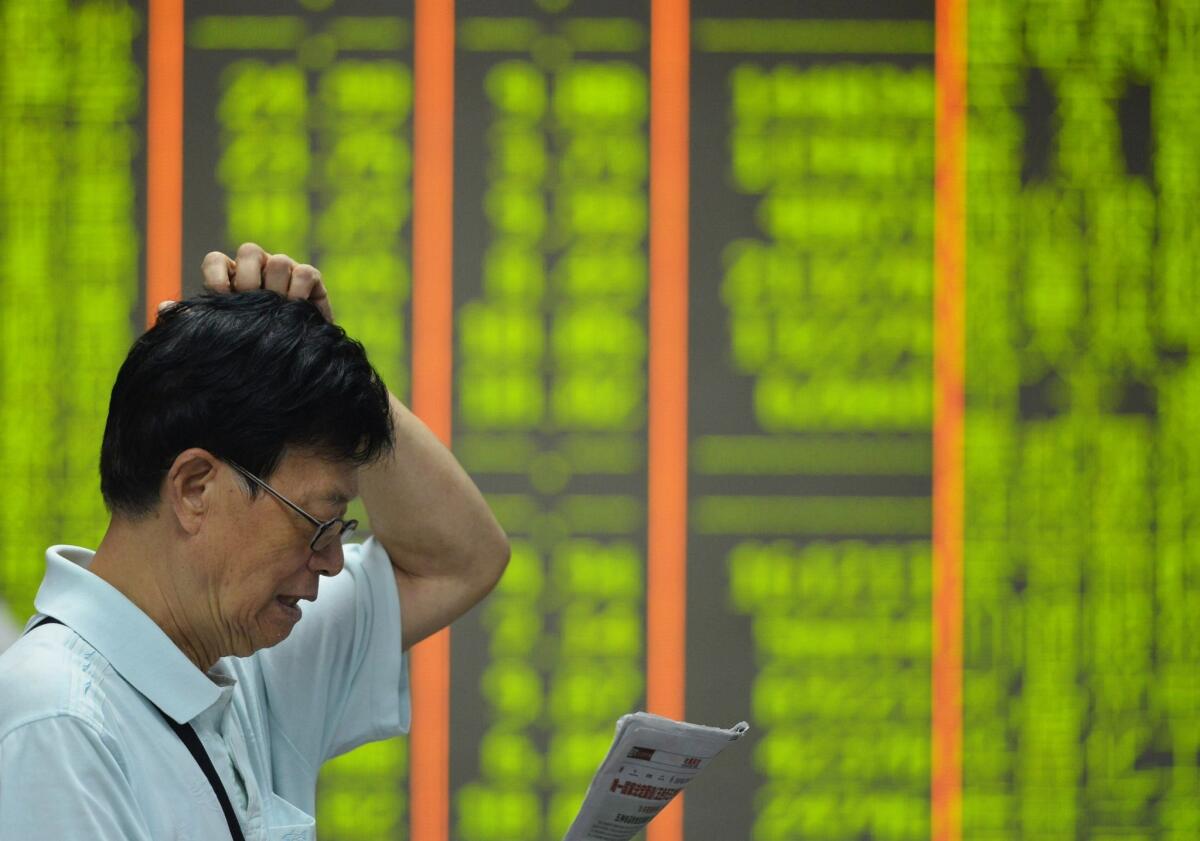China’s market meltdown triggers global sell-off; Shanghai exchange falls about 8.5%

An investor reads a newspaper before a screen showing share prices at a securities firm in Hangzhou, in eastern China’s Zhejiang province on Aug. 24.
- Share via
China’s Shanghai composite stock index fell nearly 8.5% on Monday, erasing the Chinese market’s 2015 gains and intensifying concerns of a deep economic slump in the world’s second-largest economy.
The Shanghai exchange fell 8.45% to 3,211.20 on Monday as more than 750 stocks fell by the daily 10% limit. The rout triggered a global sell-off and sent Asian markets into a tailspin -- Hong Kong’s Hang Seng index fell nearly 5%, and Japan’s Nikkei 225 stock average 4.61%, its biggest one-day drop since June 2013. The Australian market closed down 4%, in its worst one-day fall for six years. Thai, Taiwanese and Philippine markets were also hard-hit.
The sell-off intensified in European markets, with Britain’s FTSE 100 down 4.4% at the open, Germany’s DAX 4.8% and the CAC 40 of France 5.1%. In the U.S., Dow futures were down over 4% while the S&P futures were 3.6% lower.
Jeffrey Towson, a professor of investment at Peking University’s Guanghua School of Management, said China’s recent stock market volatility has raised widespread fears of financial contagion.
“This is the great fear -- that various financial institutions will go under due to exposure,” he said in an email. “And that will spread to the real economy by various means. ... I don’t see this happening. But then we don’t really know what a lot of these companies actually have on their balance sheets.”
NEWSLETTER: Get the day’s top headlines from Times Editor Davan Maharaj >>
Analysts say the Chinese government’s heavy-handed response to mid-summer turmoil in the country’s stock markets, followed by a surprise currency devaluation on Aug. 11, have shaken investor confidence in the ability of the country’s economic policymakers to mitigate a further downturn. Any protracted slowdown in China would have ripple effects around the world; global stocks have fallen by more than $5 trillion since mid-August, when the currency devaluation was announced.
“This is very much the delayed hangover of the bursting bubble,” said Fraser Howie, coauthor of “Red Capitalism: The Fragile Financial Foundation of China’s Extraordinary Rise. “Back seven weeks ago during the government intervention, when [the government] bought of billions of dollars of shares, the market thought that it would get support to encourage buying. Now, there’s some clarity that the government isn’t always going to be there.”
“At least six weeks ago there was panic selling, volatility -- ‘it may bounce back!’ -- but now there’s this resignation that the whole thing is completely over,” he continued.
The sell-off occurred despite an announcement by China’s Cabinet on Sunday that authorities would allow pension funds managed by local governments to invest in the market, potentially providing a boost worth hundreds of billions of dollars.
Chinese state media reported on Monday’s losses without commenting on government plans or policy -- Xinhua, the state news service, ran a four-line story on the plunge, focusing on markets beyond the country’s borders. Yet users of Sina Weibo, the country’s most popular microblog, voiced concerns that the rout would precipitate a global recession, similar to the 2009 financial crisis. “Is a global recession really coming?” wrote one user, Lilyyuncai. “Why shouldn’t the government adopt some measures to deal with this?”
China’s factory sector shrank at its fastest pace since 2009 in August, according to an independent survey released on Friday, suggesting that the government’s efforts to hit a 7% economic growth target for 2015 may be falling short.
“These are not the figures those concerned about the growth of the Chinese economy were hoping for in the second half of the year,” Kamel Mellahi, an expert on emerging markets and China at Warwick Business School, said in an emailed statement. “They show that the country’s pulse in factories and workshops is slowing down faster than expected.
China’s exports were down 8% year-on-year in July; auto sales were down 7%.
“The reaction of markets around the world is understandable and contains a very audible sigh of concern about the slowdown of the Chinese economy,” Mellahi said. “There is still plenty of time for the economy to pick up in the second half of the year as widely predicted, but better figures can’t come soon enough. I certainly expect the Chinese Government to pull out all the stops to hit the country’s seven per cent growth target for the year.”
Staff writer Julie Makinen contributed to this report from Taipei, Taiwan.
The Associated Press contributed to this report.
MORE ON STOCK MARKETS:
Tech sector faces challenges if the stock market slide continues
Why stocks are tumbling six years into the bull market
Stock market suffers worst one-day drop since 2008
More to Read
Inside the business of entertainment
The Wide Shot brings you news, analysis and insights on everything from streaming wars to production — and what it all means for the future.
You may occasionally receive promotional content from the Los Angeles Times.









